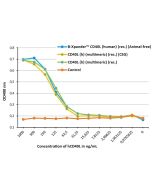Cookie Policy: This site uses cookies to improve your experience. You can find out more about our use of cookies in our Privacy Policy. By continuing to browse this site you agree to our use of cookies.
AdipoGen Life Sciences
CD40 (human):Fc (human) (rec.)

| Product Details | |
|---|---|
| Synonyms | Tumor Necrosis Factor Receptor Superfamily Member 5; TNFRSF5; CD40L Receptor |
| Product Type | Protein |
| Properties | |
| Source/Host | HEK 293 cells |
| Sequence |
The Fc portion of human IgG1 is fused to the C-terminus of human CD40 (aa 21-193). |
| Crossreactivity |
Human Mouse |
| Specificity |
Binds human and mouse CD40L. |
| Biological Activity |
Blocks the binding of CD40L to CD40. |
| MW | ~54kDa (SDS-PAGE) |
| Purity | ≥95% (SDS-PAGE) |
| Endotoxin Content | <0.01EU/μg purified protein (LAL test; Lonza). |
| Concentration | 1mg/ml after reconstitution. |
| Reconstitution | Reconstitute with 50μl sterile water. Further dilutions should be made with medium containing 5% fetal calf serum or a carrier protein. |
| Formulation | Lyophilized. Contains PBS. |
| Protein Negative Control | |
| Other Product Data |
Uni-Prot link P25942: CD40 (human) |
| Shipping and Handling | |
| Shipping | BLUE ICE |
| Short Term Storage | +4°C |
| Long Term Storage | -20°C |
| Handling Advice |
After reconstitution, prepare aliquots and store at -20°C. Avoid freeze/thaw cycles. Centrifuge lyophilized vial before opening and reconstitution. PBS containing at least 0.1% BSA should be used for further dilutions. |
| Use/Stability |
Stable for at least 6 months after receipt when stored at -20°C. Working aliquots are stable for up to 3 months when stored at -20°C. |
| Documents | |
| MSDS |
 Download PDF Download PDF |
| Product Specification Sheet | |
| Datasheet |
 Download PDF Download PDF |
CD40 belongs to the TNF-receptor superfamily and is essential in mediating a broad variety of immune and inflammatory responses including T cell-dependent immunoglobulin class switching, memory B cell development and germinal center formation. The interaction of CD40-CD40L is necessary for amyloid-β-induced microglial activation, and thus is thought to be an early event in Alzheimer disease pathogenesis. CD40 is constitutively expressed by antigen presenting cells, including dendritic cells, B cells and macrophages. Consistent with its widespread expression on normal cells, CD40 is also expressed on a wide range of tumor cells, including non-Hodgkin's and Hodgkin's lymphomas, myeloma and some carcinomas including nasopharynx, bladder, cervix, kidney and ovary.







